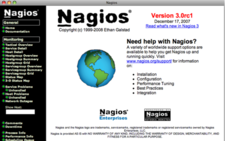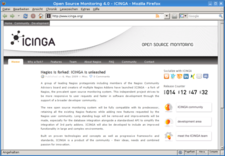Nagios Founder Comments on Icinga Fork
Nagios Enterprises founder and Nagios maintainer Ethan Galstad has admitted to development bottlenecks in his project and recognizes that Nagios developers want a stronger participation in the Icinga fork project. Nevertheless, he's disappointed that Icinga didn't engage with him before they struck off on their own.
Responding to Icinga's claim that a lack of communication on Galstad's part was one reason for the fork, Galstad said, "I am disappointed that no one from the Icinga project contacted me directly about this before the decision to fork was made... The unexpected announcement of this fork clearly demonstrates that there are communication problems on both sides of the issue." He also posed the question to Nagios critics why they didn't just request more participation in Nagios: "It's apparent that we all need to improve our communication and demonstrate better understanding of each other."

No one with years of experience in open source projects is under the illusion that community projects are the wonder drug, said Galstad. "It's interesting to watch how individuals and companies react to situations of distress and change. Challenges can bring out the best and worst in all of us." When Galstad spoke of "true intentions" and "personal character" exposed by the fork and his conviction that it will lead to an even stronger Nagios project, an accusation of treason by the Icinga project was not far off.
Galstad concretized his disappointment in a blog entry. "Forks can serve useful purposes for projects and communities... They're a natural protection mechanism built into Open Source projects." But not "first engaging with the leaders of project they intend to fork" was a problem for him. Clearly rattled by the circumstances, Galstad was uncertain about the repercussions of the split on Nagios users. But he was feisty and almost threatening when he wrote, "It may cause Nagios development, innovation, and adoption to explode like never before. It may just be one of the best things to ever happen to Nagios."

Galstad suggests "one more fork for Nagios. That being a mental fork - a change in mindset - rather than a code fork." He sees constructive collaboration on the horizon: "Are changes necessary? Yes. Will changes happen? Yes. Is Nagios dead? Hardly."
In another blog, Galstad took a stand on Nagio's trademark policy, one of the issues why Icinga wanted to split off in the first place. He used Ubuntu's trademark policy as an example and model of "allowing for advocacy and individual development, while at the same time restricting and regulating commercial usage." (See recent controversy surrounding Canonical's use of the Ubuntu One name.) Rest assured, the Nagios name will continue to be protected and nobody can use it commercially without their consent. "I realize that any confusion on the part of the community as to our stance on the Nagios trademark and our trademark policy may very well have been due to lack of clear communication on our part."
Prompting Galstad's comprehensive blog on the Icinga fork was a thread on the Nagios developer mailing list with the subject "Nagios is dead! Long live Icinga!" (the thread beginning "6 May 11:57"). Galstad's blog includes links to further blog entries related to trademarks, forks and the future of Nagios.

Comments
comments powered by DisqusSubscribe to our Linux Newsletters
Find Linux and Open Source Jobs
Subscribe to our ADMIN Newsletters
Support Our Work
Linux Magazine content is made possible with support from readers like you. Please consider contributing when you’ve found an article to be beneficial.

News
-
Introducing matrixOS, an Immutable Gentoo-Based Linux Distro
It was only a matter of time before a developer decided one of the most challenging Linux distributions needed to be immutable.
-
Chaos Comes to KDE in KaOS
KaOS devs are making a major change to the distribution, and it all comes down to one system.
-
New Linux Botnet Discovered
The SSHStalker botnet uses IRC C2 to control systems via legacy Linux kernel exploits.
-
The Next Linux Kernel Turns 7.0
Linus Torvalds has announced that after Linux kernel 6.19, we'll finally reach the 7.0 iteration stage.
-
Linux From Scratch Drops SysVinit Support
LFS will no longer support SysVinit.
-
LibreOffice 26.2 Now Available
With new features, improvements, and bug fixes, LibreOffice 26.2 delivers a modern, polished office suite without compromise.
-
Linux Kernel Project Releases Project Continuity Document
What happens to Linux when there's no Linus? It's a question many of us have asked over the years, and it seems it's also on the minds of the Linux kernel project.
-
Mecha Systems Introduces Linux Handheld
Mecha Systems has revealed its Mecha Comet, a new handheld computer powered by – you guessed it – Linux.
-
MX Linux 25.1 Features Dual Init System ISO
The latest release of MX Linux caters to lovers of two different init systems and even offers instructions on how to transition.
-
Photoshop on Linux?
A developer has patched Wine so that it'll run specific versions of Photoshop that depend on Adobe Creative Cloud.

great post
http://www.cocoschanel.com
http://www.gucciguccis.com
http://www.urboots.com
http://www.handbags2012.com
http://www.louisvuittonslv.com
http://www.uggmalls.com